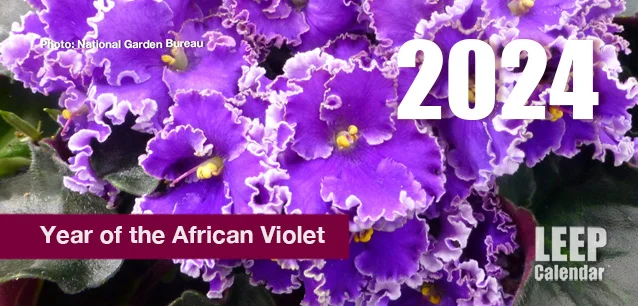 AD
AD
Today is: January 07
Scroll to explore events active on this date.
Additional Events on LEEP
LEEP INK FEATURES

August? Absolutely!
In August, we live through the Dog Days of Summer. It's hot and often humid, and those who can leave for better climates do. Down south, winter is in full force. August is also known as "the ...

In The Heat of July: July 2025 Events
Is it hot enough (or cold enough if you're below the equator) for you yet? There is actually a day for that! Like every month, I pick a diverse collection of events you may or may not know about. This ...

May Blooms: Events in May 2025
Along with October, May is one of the most densely packed months of the year. It's before the summer humidity and the last whole month of the school year. The weather is warming in t...
About 2024, the Year of the African Violet
Retail , Africa
Ends: Dec 31, 2024
DESCRIPTION:
2024 is the Year of African Violets.
African violets, scientifically known as Saintpaulia, are a popular genus of houseplants originating from Tanzania and southeastern Kenya in East Africa. Discovered in 1892 by Baron Walter von Saint Paul-Illaire, they have since captivated plant enthusiasts worldwide. The appeal of African violets lies in their vibrant blooms and lush, velvety leaves, making them a prized addition to indoor gardens.
There are over 20 originating species of African violets; through extensive hybridization, enthusiasts have developed thousands of varieties in various colors, patterns, and sizes, ranging from the traditional purple to pink, white, blue, and even multicolored flowers.
The violet's popularity as houseplants began to surge in the mid-20th century, particularly in the United States, where they became a fixture in homes due to their year-round blooming potential and compact size, suitable for indoor spaces. African violets are known for their temperamental nature, making them challenging to grow.
Each requires specific growing conditions to thrive: moderate to bright, indirect light, high humidity, and well-drained soil. Over-watering or under-watering leads to problems, as can the wrong type of water; they are sensitive to cold water and excessive minerals. Furthermore, they need a consistent temperature and are prone to pests and diseases. That's not all. Their delicate roots and preference for stable environments contribute to their reputation as a somewhat difficult plant to maintain.
Perhaps due to their nature and difficulty, this engendered the lovely plant and entered popular culture as the plant for green thumbs. Not everyone could keep them alive. If you could, your reputation as the ultimate gardener skyrocketed with your friends.
VIDEOS
SUPPORTING DOCUMENTS
Currently, this event does not have supporting documents.
ADDITIONAL IMAGES
Currently, this event does not have supporting images.
Where would you like to go now?
 AD
AD


/footer-logo.svg)
